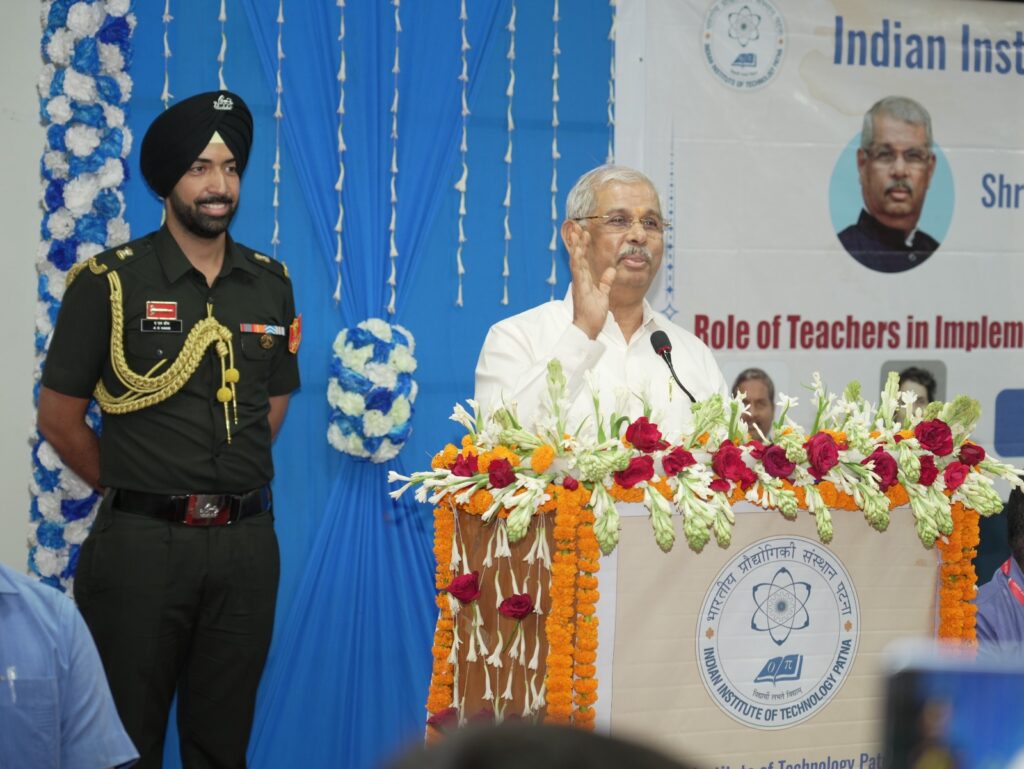By Kumari Swati

The Indian Institute of Technology Patna, in collaboration with Bhartiya Shikhsan Mandal, effectively conducted an enlightening and thought-provoking seminar on the National Education Policy (NEP 2020). The seminar, held on Tuesday, October 10th, 2023, at IIT Patna, centered on the crucial role that teachers play in the successful implementation of the National Education Policy 2020.
The workshop had the esteemed presence of Shri Rajendra Vishwanath Arlekar, the Honourable Governor of Bihar, as the chief guest. Among the distinguished guests were Prof. Binde Kumar, Director of IGIMS Patna, and Professor Vineeta Sahay, Director of IIM Bodhgaya. The event was presided over by Shri B. R. Shankaranand Ji, the Organizing Secretary, and Prof. T. N. Singh, the Director of IIT Patna. Numerous dignitaries graced the occasion with their presence.
The event commenced with the National Anthem, followed by the ceremonial lighting of the traditional lamp by the esteemed Governor of Bihar, Shri Rajendra Vishwanath Arlekar, alongside Prof. Binde Kumar, the Director of IGIMS Patna, Professor Vineeta Sahay, the Director of IIM Bodhgaya, Shri B. R. Shankaranand Ji, and Prof. T. N. Singh, the Director of IIT Patna.
Professor T. N. Singh extended a warm welcome to the distinguished guests and elucidated the significance of the National Education Policy (NEP), highlighting its fusion of ancient Indian educational heritage with contemporary pedagogical techniques.
In addition, Shri B. R. Shankaranand contributed valuable insights by emphasizing the NEP’s foundation on the four pillars: Affordability, Accessibility, Accountability, and Acrossability. He stressed the imperative for every educational institution to attain financial sustainability and eloquently stated, “Disha Taye Ho Gayi hai, Gati deni baaki hai” – signifying that while the direction has been set, the momentum must continue.
Furthermore, Mr. Shankaranand underscored the pivotal role of brainstorming and deliberation in the implementation of NEP 2020, particularly in the context of today’s technology-driven landscape.
Dr. Bindey Kumar emphasized that the National Education Policy (NEP) is geared towards promoting inclusive, equitable, and comprehensive education. He highlighted the NEP’s emphasis on utilizing students’ mother languages in education. Dr. Kumar also pointed out that the NEP incorporates cutting-edge technologies such as robotics, AI, big data analysis, nano-technology, and other emerging innovations, which are already being employed to advance the field of medical sciences.
Furthermore, Professor Vinita Sahay has highlighted that the National Education Policy (NEP) of 2020 places a strong emphasis on holistic development and skill-based education. The NEP serves as a comprehensive framework with the dual aim of providing flexibility to both administrators and students. India, currently boasting a population of 1.4 billion, has surpassed China in terms of population size. It is essential to note that our population is predominantly youthful, with a median age of 28 years, and an impressive 67 percent falling within the age bracket of 19 to 35 years. This demographic advantage should be viewed as a promising foundation for India’s bright future.
Every child possesses unique qualities and requires distinct methods of engagement, each yielding productive outcomes in their own way. The Hon’ble Governor underscores that, in addition to comprehending the letter of the National Education Policy (NEP), it is equally imperative to grasp and wholeheartedly embrace its underlying spirit.
In his conclusion, he emphasizes that India is currently undergoing a significant transformation, with the entire world closely observing our progress. We cannot afford to shy away from this responsibility; we must all actively participate in this transformative journey.
Following the impactful and insightful inaugural talks by distinguished guests on the “Role of Teachers in the Implementation of the National Education Policy (NEP) 2020,” the event proceeded with six technical sessions related to the subjects, featuring renowned academicians from various prestigious institutions. These included Professor Sunil Khijwania from IIT Guwahati, Professor P.K. Mishra from IIT BHU, Professor Raj Bihari Singh from Patna University, Professor K.C. Sharma from IIT Patna, Professor Milind S. Marathe, Chairman of the National Book Trust, and Professor Rana Purushottam from Nava Nalanda Mahavihara.
IIT Patna is committed to achieving the aspirational goals of 21st-century education while upholding India’s rich tradition, culture, and core values. To realize this vision, we have embarked on a significant initiative to convene esteemed leaders from various sectors of the education landscape across the nation. The objective is to engage in comprehensive discussions on the National Education Policy 2020 and work collaboratively towards the restoration of India’s status as a “Knowledge Guru,” thereby contributing to the nation’s prosperity and strength once more.
The meaningful workshop concluded with a vote of thanks delivered by Academic Dean Prof A.K. Thakur, IIT Patna. The workshop was attended by a significant number of scholars, academicians, and distinguished individuals from renowned institutions across India.

